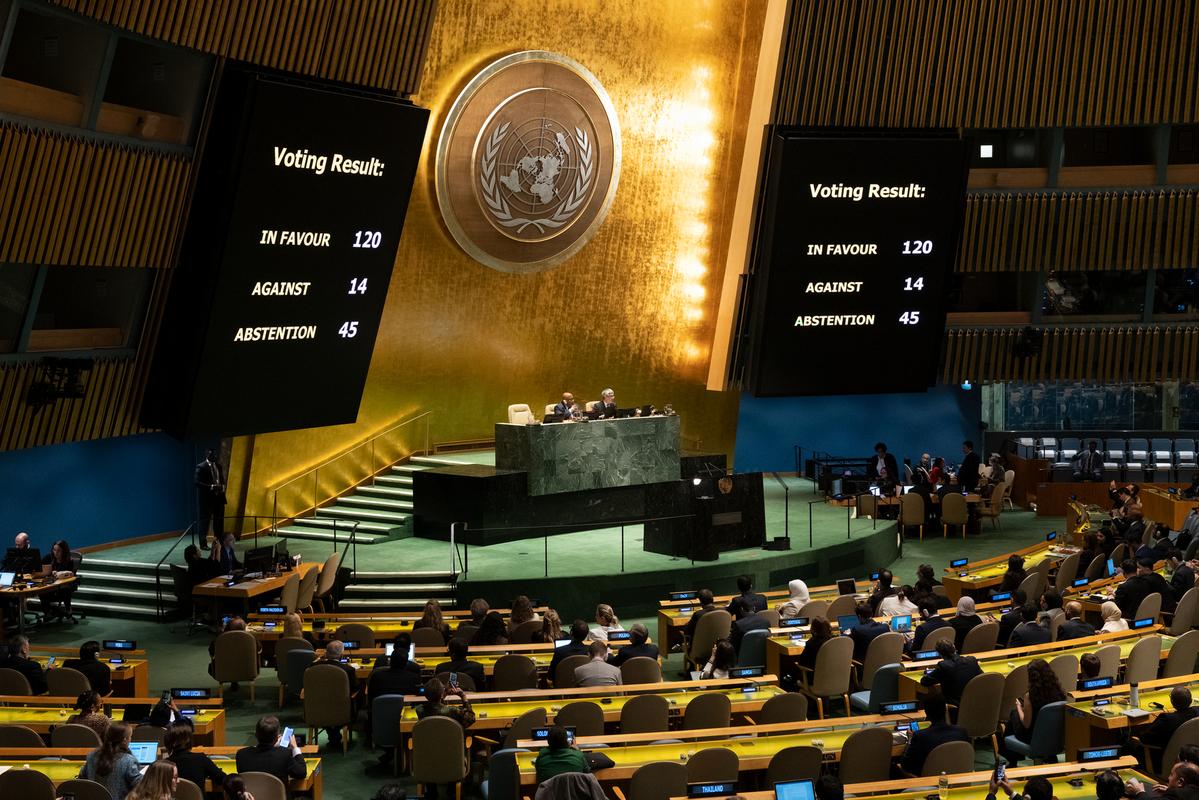
Photo taken on Oct 27, 2023 shows the voting during the 10th Emergency Special Session of the UN General Assembly at the UN headquarters in New York. The General Assembly on Friday adopted a resolution that calls for a humanitarian truce in Gaza. [Photo/Xinhua]
This is an editorial from China Daily.
The United Nations General Assembly's adoption of the resolution "Protection of civilians and upholding legal and humanitarian obligations" on Friday represents a key global consensus on the Palestinian question.
The recorded vote of 121 in favor to it, 14 against, with 45 abstentions, highlights that the resolution points to the right direction to resolve the Israel-Palestine hostilities, which flared up on Oct 7.
However, the resolution will not immediately affect the situation, as most of the 45 abstentions in the vote on the Gaza resolution, which calls for an immediate, sustained humanitarian truce leading to cessation of hostilities between the two conflicting sides, are from the US camp. They include the United Kingdom, Germany, Canada, Australia, Italy and Japan, plus India, which is doing Washington a big favor, no doubt, in exchange for something in the future.
That the resolution was passed on the same day that Israel initiated a large-scale incursion into the north of Gaza, amid reports that Washington is mulling an emergency plan to withdraw US citizens from the Middle East, is an indication of a fact. That is Washington is not applying pressure on its ally in pursuit of peace, but instead preparing for the continued escalation of the conflict, not only between Israel and Palestine, but the whole Arab world.
While the US clique has been divided on the issue thanks to some of its members' grave concerns about the way Israel is nagging in "self-defense". These countries' abstention in the vote means they have chosen to acquiesce in the US' open support of Israel, which already has the indisputable upper hand in the conflict.
If the US and its allies are preparing for a prolonged conflict, viewing it as an opportunity to resolve the Palestinian question in favor of the US' key regional ally, the conflict will not be quickly brought to an end, the Ukraine crisis being an evidence of that.
In other words, the West is still holding an opaque "united front" on the Palestinian question, as it has over the past decades, which is why the "two-state solution", ostensibly agreed by the two sides decades ago, was not truly implemented.
As such, although the international pressure might lead to some channels being opened to provide limited humanitarian aid, there is still a long way to go to transform the UN Gaza resolution into concrete actions that can bring an end to the conflict.
The Israel-Palestine crisis is undoubtedly another proxy conflict for the US and its clique. The urgent need for humanitarian aid and a cessation of hostilities, as civilians, including those on the Israeli side, are paying with their lives day and night, have never been a concern of Washington. Its sole consideration is how it can best steer and exploit the conflict, along with its spillover effects, so that it produces the utmost advantages on the geopolitical chessboard of the US.

 中文
中文



